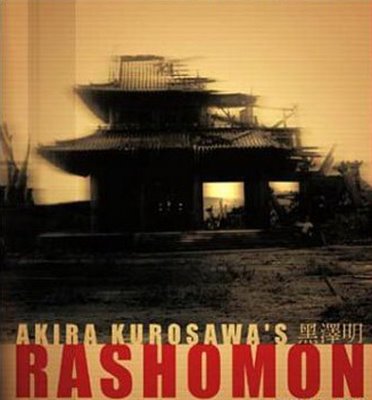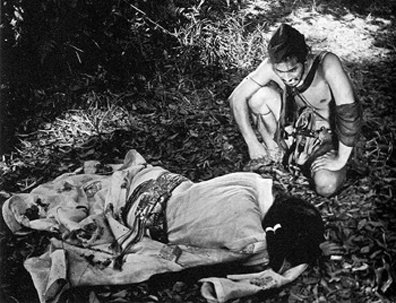Rashomon (1950)
Genre: Period Samurai Crime Drama Mystery Thriller (Japan)
Starring: Toshiro Mifune (The Hidden Fortress; Seven Samurai), Machiko Kyo (Street Of Shame; Ugetsu)
Directed By: Akira Kurosawa (Yojimbo; Ran)
Overview: The events of a rape and murder are told from the perspectives of four people, each version different than the last.
Acting: The first time I saw a Kurosawa film, Seven Samurai, I thought, "My Lord, the acting is over-ripe!" After a while, at around the third film, one comes to realize that this is Kurosawa's intention, a melodramatic portrayal to bring forth the raw emotions of war and helplessness, common enough themes of his. I took my girlfriend to this one, who had never seen Kurosawa before, and she had that same "You've got to be kidding..." look about her. It's slow getting used to Toshiro Mifune's cackling laughter, but it definitely grows on you.
Rating: 8
Cinematography: The opening shot: a large half-destroyed temple, the forgotten sign 'Rashomon' hangs askew and cracked as a deluge of rain pours down. Four soaked men ponder the recent events. The next shot is tightly cropped, focusing on the woodcutter's axe resting on his shoulder as he walks, then the camera points up at the sky, and we see the sun through the trees. In the first 20 minutes I was reeling at the incredible visuals. Holy God. Some trivia... This film is attributed with being the first to point a camera directly at the sun.
Rating: 9
Script: "It's human to lie. Most of the time we can't even be honest with ourselves."
Without a doubt, there is deep poetry in this. The medium is haunting, the priest's sermonic words carry a hefty load, and the unveiling of certain truths would not have succeeded as well as they had without this script. The words set up a bleak present, filled with the cruelty of man. The use of the witnesses speaking to an unseen and unheard questioner is also original and effective.
Rating: 9
Plot: This is the thing: the film is a touch dated. The classic tale of four people huddled around retelling their version of a terrible story... it seems to have been done many a time. Sure Kurosawa may have been one of the first to do it on film but that's the problem with legends, everyone copies them. There was some slow moving story elements that for some reason made me wonder from time to time, "Why does everyone think this is so great?"
Rating: 7
Mood: A dated film can be a double-edged sword. In medieval Japan, the stigma of being a woman who has been with two men is clearly too much to bear, whether rape or not. That is a very interesting historical perspective that enhances. The account from the dead man himself, through a medium, made the audience chuckle at the premise, though she was frightening and quickly had us in her clutches. The ending seemed too black and white however, the lesson made so bold and clear that it left nothing to the imagination.
Rating: 7
Overall Rating: 80% (A Sho To Remember)
Aftertaste: This is a classic of the Kurosawa collection, and if you like this guy, see it. It's that simple. I read that this was the movie that made the Academy Awards create a "Best Foreign Film" category. Imagine being responsible for that? I'm 30 years old and I've hardly seen any of this man's films. I'll get around to it, don't you worry. I weep sometimes at the thought.
Yes I do. I'm weeping now.
Starring: Toshiro Mifune (The Hidden Fortress; Seven Samurai), Machiko Kyo (Street Of Shame; Ugetsu)
Directed By: Akira Kurosawa (Yojimbo; Ran)
Overview: The events of a rape and murder are told from the perspectives of four people, each version different than the last.
Acting: The first time I saw a Kurosawa film, Seven Samurai, I thought, "My Lord, the acting is over-ripe!" After a while, at around the third film, one comes to realize that this is Kurosawa's intention, a melodramatic portrayal to bring forth the raw emotions of war and helplessness, common enough themes of his. I took my girlfriend to this one, who had never seen Kurosawa before, and she had that same "You've got to be kidding..." look about her. It's slow getting used to Toshiro Mifune's cackling laughter, but it definitely grows on you.
Rating: 8
Cinematography: The opening shot: a large half-destroyed temple, the forgotten sign 'Rashomon' hangs askew and cracked as a deluge of rain pours down. Four soaked men ponder the recent events. The next shot is tightly cropped, focusing on the woodcutter's axe resting on his shoulder as he walks, then the camera points up at the sky, and we see the sun through the trees. In the first 20 minutes I was reeling at the incredible visuals. Holy God. Some trivia... This film is attributed with being the first to point a camera directly at the sun.
Rating: 9
Script: "It's human to lie. Most of the time we can't even be honest with ourselves."
Without a doubt, there is deep poetry in this. The medium is haunting, the priest's sermonic words carry a hefty load, and the unveiling of certain truths would not have succeeded as well as they had without this script. The words set up a bleak present, filled with the cruelty of man. The use of the witnesses speaking to an unseen and unheard questioner is also original and effective.
Rating: 9
Plot: This is the thing: the film is a touch dated. The classic tale of four people huddled around retelling their version of a terrible story... it seems to have been done many a time. Sure Kurosawa may have been one of the first to do it on film but that's the problem with legends, everyone copies them. There was some slow moving story elements that for some reason made me wonder from time to time, "Why does everyone think this is so great?"
Rating: 7
Mood: A dated film can be a double-edged sword. In medieval Japan, the stigma of being a woman who has been with two men is clearly too much to bear, whether rape or not. That is a very interesting historical perspective that enhances. The account from the dead man himself, through a medium, made the audience chuckle at the premise, though she was frightening and quickly had us in her clutches. The ending seemed too black and white however, the lesson made so bold and clear that it left nothing to the imagination.
Rating: 7
Overall Rating: 80% (A Sho To Remember)
Aftertaste: This is a classic of the Kurosawa collection, and if you like this guy, see it. It's that simple. I read that this was the movie that made the Academy Awards create a "Best Foreign Film" category. Imagine being responsible for that? I'm 30 years old and I've hardly seen any of this man's films. I'll get around to it, don't you worry. I weep sometimes at the thought.
Yes I do. I'm weeping now.



<< Home